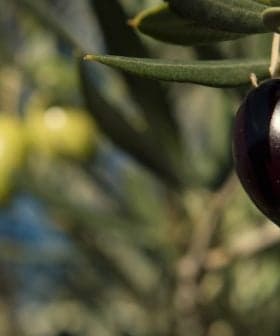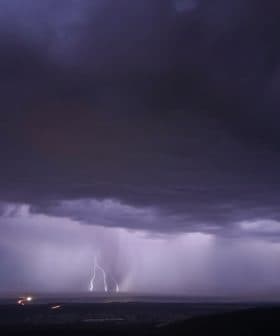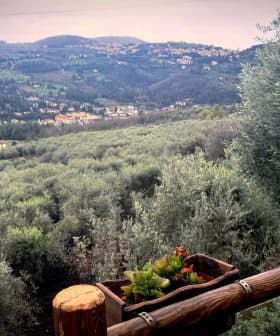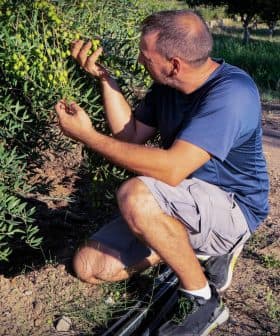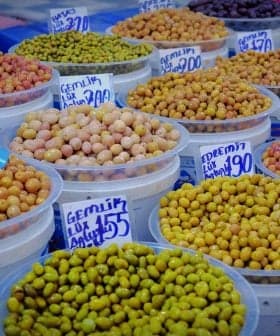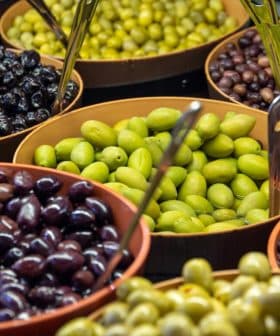Inclement Weather Dampens Argentina Olive Harvest, But Quality Remains High
Estimates for the 2021 harvest see production falling or remaining steady. Producers say they are more concerned about exports and prices.
 Photo: Maria Gabriela Panelli
Photo: Maria Gabriela PanelliArgentina’s olive harvest is expected to be lower than in previous years due to bad weather, leading to a state of emergency and agricultural disaster declaration in the province of San Juan. Despite challenges such as reduced output and competition from Chile, the industry is experiencing stable olive oil prices and improving economics for producers.
Argentina’s olive harvest is expected to be slightly lower than in previous years following bad weather impacting the industry.
Intermittent episodes of frost, hail, intense rainfall and floods led the Ministry of Agriculture to declare a state of emergency and agricultural disaster across the olive-grove-rich province of San Juan.
In 2020/21 campaign is expected to reach 80,000 tons for table olives and 27,000 tons for olive oils, both with a decrease from the previous campaign.
In a statement, the ministry specifically mentioning the damage done to olive growers, along with vineyards and other fruit orchards.
These declarations followed a May 17thstatement in which a 180-day state of emergency and agricultural disaster was declared, “for reasons of late frosts and extreme temperatures for the olive-growing activity of Catamarca.”
See Also:2021 Harvest UpdateThe impact on the industry and this year’s output is likely to be severe, with one expert forecasting a double-digit fall.
Andrés Boscovich, an analyst with IES Consultores, told Olive Oil Times that the total olive harvest is expected to be about 16-percent lower than in the previous campaign.
“In 2020/21 campaign is expected to reach 80,000 tons for table olives and 27,000 tons for olive oils, both with a decrease from the previous campaign,” he said.
The Argentina Olive Federation predicts that the harvest will be closer to 30,000 tons of olive oil, roughly the same amount produced in 2020.
While production in Argentina remains more or less steady and seems far from surpassing the record-highs of 2018, improving economics is a major consolation for producers.
While volumes are down, olive oil prices are at least stable with a slight rise – helped by the decision of the Argentinian government to drop export taxes which has helped make the product cost-effective.
“The 2020 export price has been low, but in the current year, it went up six percent in the first quarter,” Boscovich said.
According to the Argentina Olive Federation, high export duties and other production costs severely limit the sector’s potential. If these burdens were reduced, Argentina could produce twice as much olive oil, the federation believes.
Producers in the field have largely supported the broader view on the sector taken by analysts, with one grower telling Olive Oil Times that quantity was down, but the quality was ”very good.”
This was corroborated by another producer who paid tribute to the industry’s ability to get the harvest despite the complications created by the Covid-19 pandemic.
“It was undoubtedly a difficult harvest due to the effects of Covid-19,” Maria Gabriela Panelli, the commercial manager of Olivum, told Olive Oil Times. “However, we are already in the last days, proud to have gone through it taking care of our people. Argentina expects a good harvest, and very good general quality of its oils already characterizes us.”
“We had to quickly adapt to new and varied protocols to move forward with the harvest and production of the oils, as well as establish protocols for the circulation of trucks with fruit, processed products and to continue exporting,” Panelli added.
Harvests have been volatile in recent years, averaging 91,000 tons of olives harvested from 2016 to 2021, Boscovich pointed out. Climate conditions, which heavily determine the result of the harvest, are the main reason for volatility, along with prices.
“The present harvest is likely to finish in September 2021,” Boscovich said, adding it would be “difficult,” but part of a global pattern of declining world production from the previous year.
Despite poor harvests across much of the Mediterranean, a relatively good year in Spain in 2020 may also dampen the outlook for Argentian producers looking to sell their oils abroad.
“In 2020, Spain bought a lot of olive products because of the crisis that the olive sector experienced in that country,” Boscovich said. “In the current campaign, [we] are not expecting sales to Spain, and it is difficult to open new trade markets on this year.”
As a result of this stasis, Argentina’s export markets for both table olives and olive oil are likely to remain unchanged and go to neighboring countries, such as Brazil, Chile, Paraguay and Uruguay, along with the United States.
Among the challenges that producers who seek to export their products face this year is the ongoing need to invest in transportation infrastructure, which the pandemic has exacerbated.
“The global problems of maritime and air transport affect both the import of goods and spare parts and the export of oils,” Panelli said. “Let’s hope the end of the pandemic is approaching.”
Boscovich added that another worry for producers is increasing competition from Chile, which continues to have consistent and high-quality harvests over the previous few years and is getting increasing recognition on the world stage.


